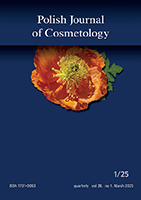search by
Copyright @ Pol J CosmetolAnalysis of the skin microbiomy in patients with psoriasis vulgarisNatalia Hoffman, Agnieszka Garncarczyk, Agnieszka Lubczyńska, Dominika Wcisło-Dziadecka Katedra Kosmetologii, Zakład Kosmetologii, Wydział Nauk Farmaceutycznych w Sosnowcu, Śląski Uniwersytet Medyczny w Katowicach Summary Introduction. Psoriasis is a chronic inflammatory skin disease characterized by a recurrent course. This disease has a genetic, environmental, and also immune basis. Psoriasis can develop at any age, and depending on the location and the course, it´s divided into plaque vulgaris, pustular psoriasis, articular psoriasis, nail psoriasis and psoriatic erythroderma. The most common type of the psoriasis is plaque psoriasis, which mainly occurs around the scalp, elbows, and knees. Treatment of this disease includes local, general, and biological therapy. The therapeutic method should be so selected, that the periods of psoriasis remission are as long as possible, and the side effects of the treatment are significantly minimized. The bacterial flora of the skin, which includes microorganisms that have a protective function for the whole organism, is characterized by a specific qualitative and quantitative composition depending on the condition of the skin. Aim. The aim of the study was to analyze the microbiome of the skin lesions in patients suffering from psoriasis. Material and methods. The study included 24 patients suffering from psoriasis. Samples of psoriasis lesions were isolated from the patients and then subjected to bacteriological and mycological examination. Results. The analysis of the collected material showed that coagulase-negative Staphylococcus bacteria are present in 95.8% of the patients. On the other hand, the mycological study carried out with the use of the direct preparation proved that the lesions of all patients are free from dermatophytes, while the study using culture study showed that psoriasis lesions of one patient were colonized by Cladosporium. Conclusion. The present study proved that the microbiome of psoriasis lesions depends on the type of local and general therapy directed against psoriasis. Key words: microbiome, psoriasis |




